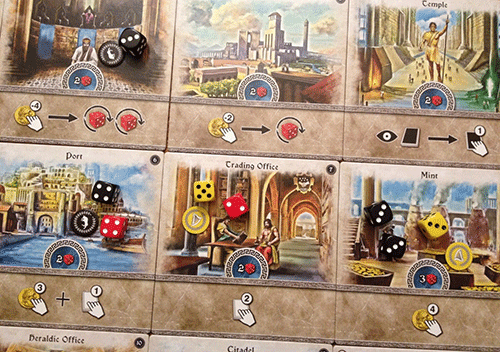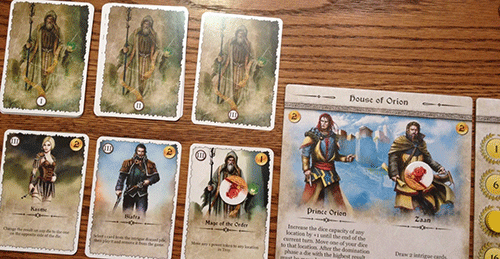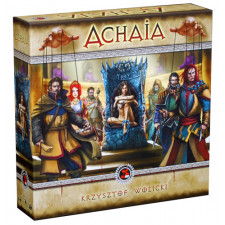Achaia Review
on Oct 19, 2016
Creating a board game that effectively captures a popular intellectual property can be tricky. That difficulty is exacerbated when it’s based on a modern national treasure and then released to a foreign market wholly unfamiliar with its setting. Thus Achaia, inspired by the wildly influential and best-selling Polish fantasy novels of Andrzej Ziemiański, reaches U.S. shelves.
Without knowing its literature the game’s characters, world setting, and concepts mean very little aside from mood and/or flavor text. For example, Achaia is not a place, as I first presumed, but a woman and the story’s central protagonist. And though the city you seek to control is Troy, it has nothing to do with Greece. The rule book includes a wonderful back story, yet it comes across as a Game of Thrones knock-off to one oblivious to the novels.
Creating a custom world is certainly common in board game design and generally doesn’t present a problem, even if the majority of them do not influence mechanics in significant ways. So Achaia’s setting is similarly innocuous at first blush. Then you notice the card illustrations. Without context, though, some of it is bizarrely sexualized, sexist and in one case borderline misogynistic. Apparently they represent elements in the Polish novels, though one could still argue they seem targeted at junior high boys. Nonetheless, the art in question seems jarringly out of place independent of the source material. Perhaps your preferences will differ from my American and conservative - or both - sensibilities, and won’t pose an issue? I had to remove a couple cards to play the game with my teenage sons.
While the setting may be alien to the uninitiated, the theme is universal - political intrigue. And game play exudes that in spades! It also mixes a few mechanisms in new ways that create a unique experience so that familiarity with the novels isn’t necessary.

Dice may not look intimidating, but these can do some nasty things!
The goal in Achaia is to amass power points by controlling locations in Troy. Twelve tiles represent these areas. You exert influence with dice - three to begin the game and adding one in each of the next two rounds. You can roll all your dice and use those values - with one mulligan. Or you can assign a number of points across them, which is the variant you should use. After assigning your initial trio of conspirators you’re ready to plot, connive and scheme channeling your inner Littlefinger - or whoever his equivalent is in Achaia.
To control a location you must compile a greater value in pips there - a not-so-simple task. That’s because during the game’s main intrigue phase, everyone will be playing cards or paying for the services of random characters to re-roll dice, move them, or flat out change their values. Just as you manage a majority in one place, another contrives to undo your efforts by changing one of your die or sending it across town. These power moves are neither isolated nor rare. They are the heart of the game in this highly interactive, take-that design of tactical brinksmanship, bluff and bold moves. Executing them at the right time can be quite difficult, but just as rewarding when you pull it off.
The design includes defense mechanisms in the form of Cousin cards - which aren’t always successful, nor abundantly available. Still, they can offer some protection or deterrent - because everyone can keep track of your bodyguards. Yet deciding when to expend them and when to save them for nastier attacks later on creates more angst-ridden moments in a game already fraught with unknown moves around every street corner and wrought with palpable tension.
During this card playing phase there are two other considerations. In addition to striving for area control each tile provides an action to any dice located there after the intrigue phase. This worker placement aspect means you must balance your power grabbing efforts with an eye on other tiles that provide a benefit. The first player to pass in the intrigue phase also gets to play his or her event card, which can prove rewarding. Additionally, after passing you earn two gold every time play circles back to you as long as at least one other player remains in the round. Bow out early enough and you could reap a lucrative bonus.
Alas, these decisions only aggravate your anxiety. Any move to nab a tile’s placement ability can be thwarted by an opponent’s intrigue action. And even if you reap the rewards of an event card and extra gold after passing, you’re essentially at the whims of others while you sit out, tossing and fretting over the political machinations swirling around you.

I’ll do something for you…for the right price!
After the intrigue phase is the pretentiously labeled domination phased. It and the next preparation phase are essentially housekeeping items. Pips are counted, power tokens placed, point markers advanced, tile actions resolved and the board primed for the next round. Then the tension envelops the table again with the next intrigue phase. There are three total. Survive them all and claim Troy.
Achaia is not for the timid or orderly. It is an angst-ridden storm of shifting power, back-stabbing and ever-changing positions that often fly out of control, no matter how well you try to shore up your footing. Familiarity with its source material and setting may enhance your enjoyment, but isn’t necessary. Because its theme of unadulterated intrigue is ubiquitous - and one we can all get behind.

 Customer Support
Customer Support  Subscribe
Subscribe 




 Account
Account  Wishlist
Wishlist 

